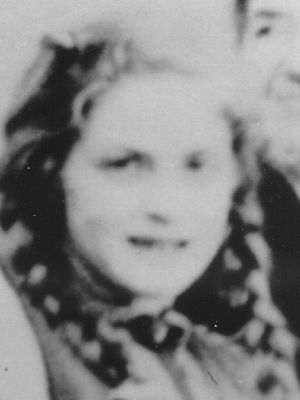
Hanna grew up in a small German town close to the Dutch border. Her father, Carl Frank, bought and sold cattle. Her mother Olga died when Hanna was five. She grew up surrounded by a large, extended family, including four unmarried aunts. The Nazis came to power in Germany in 1933, but at first, the Frank family did not take them seriously. Hanna's father remarried when Hanna was seven years old, and she became very close to her stepmother, Irma. Hanna's little sister, Marga, and her brother, Manfred, were born a few years later. During the early years of the Nazi regime, many Jewish-owned businesses were confiscated and Jews were barred from most professions. Jews were later required to wear the yellow star. Hanna's father began smuggling Jewish refugees across the border into Holland. In September 1938, ten year-old Hanna began attending a school run by nuns. She was the only Jewish child in the school. In November 1938, after country-wide acts of terror and destruction were directed against Germany's Jews, Hanna's father was arrested and sent to prison. Hanna was expelled from school because she was Jewish. The family was impoverished and trapped.
Early in 1941, Hanna's father was released from prison. In December 1941, the family was notified that they were to be deported to the "East." The Frank family, along with 16,000 other German Jews, were sent to Riga, the capital city of Latvia. They were forced to live in a sealed-off ghetto, whose previous residents, over 30,000 local Jews, had been murdered. Conditions in the ghetto were horrendous. There was little food and water, and most sanitary facilities had been shut down. Thousands died from starvation, disease, and exposure. Others were shot at the whim of the Nazis. Fourteen year-old Hanna lived in one room with her father, stepmother, little brother, sister, and her four aunts.
On November 2, 1942, while Hanna was at work, the ghetto was emptied. The Nazis rounded up their prisoners and gassed them in sealed transport vans. Hanna and other able-bodied workers were sent to a work camp. When the Russian army began advancing on the area, Hanna and other Jewish workers were shipped to labor camps in Germany. Forced to work at hard labor, Hanna was constantly cold, hungry and afraid. Realizing that Germany was losing the war, the camp commander arranged for his prisoners to be exchanged through the Red Cross. On May 3, 1945, seventeen year-old Hanna was sent to Sweden, and freedom.

